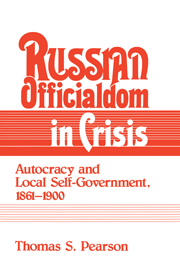Book contents
- Frontmatter
- Contents
- Preface
- Acknowledgments
- 1 Introduction: old problems, new principles – tsarist government and the Great Reforms
- 2 The birth of a new rural order: the state and local self-government, 1861–75
- 3 The breakdown of tsarist administrative order, 1875–81
- 4 The debate revived: state, social change, and ideologies of local self-government reform, 1881–5
- 5 State control over local initiative: the Land Captain Statute of 1889
- 6 The politics of the zemstvo counterreform, 1888–90
- 7 Conclusion
- Select bibliography
- Index
2 - The birth of a new rural order: the state and local self-government, 1861–75
Published online by Cambridge University Press: 08 October 2009
- Frontmatter
- Contents
- Preface
- Acknowledgments
- 1 Introduction: old problems, new principles – tsarist government and the Great Reforms
- 2 The birth of a new rural order: the state and local self-government, 1861–75
- 3 The breakdown of tsarist administrative order, 1875–81
- 4 The debate revived: state, social change, and ideologies of local self-government reform, 1881–5
- 5 State control over local initiative: the Land Captain Statute of 1889
- 6 The politics of the zemstvo counterreform, 1888–90
- 7 Conclusion
- Select bibliography
- Index
Summary
The reign of Alexander II is understandably remembered more for the emancipation of the serfs than for the reorganization of ministerial power, because the peasant reform in Russia was unique in nineteenth-century Europe in its scope and complexity. Fittingly enough, it is commonly regarded as the beginning of the modern era in Russian history. With the stroke of a pen, Alexander II signed into law measures that in 1862–6 liberated nearly 90 percent of his subjects, although getting the peasants, landed gentry, and various officials to abide by its provisions proved far more nettlesome. Yet, in the same period the tsar contemplated a far-reaching comprehensive reform of local administration that would have affected all levels and nearly all elements (police, judiciary, municipal, and rural self-government). The boldness of the vision reflected the government's desire in the mid-1850s to eradicate much of the Nicholaevian order; as fate would have it, the failure of the reformers to enact such a comprehensive plan, owing to resistance from gentry conservatives led by Mikhail Nikolaevich Murav'ev, the minister of state properties (1857–62), revealed even more about elite bureaucratic politics in the Great Reform era. By separating the economic functions of the police from their security role (1858), the state committed itself to a process of piecemeal administrative reform that compounded the fragmented nature of local administration and made local self-government reform the focus of bitter ministerial conflict throughout the postreform era.
The development of peasant self-government
In calling for the abolition of serfdom in his 30 March 1856 speech to the Moscow gentry, Alexander II initiated a reform program of staggering proportions and complexity.
- Type
- Chapter
- Information
- Russian Officialdom in CrisisAutocracy and Local Self-Government, 1861–1900, pp. 21 - 59Publisher: Cambridge University PressPrint publication year: 1989



